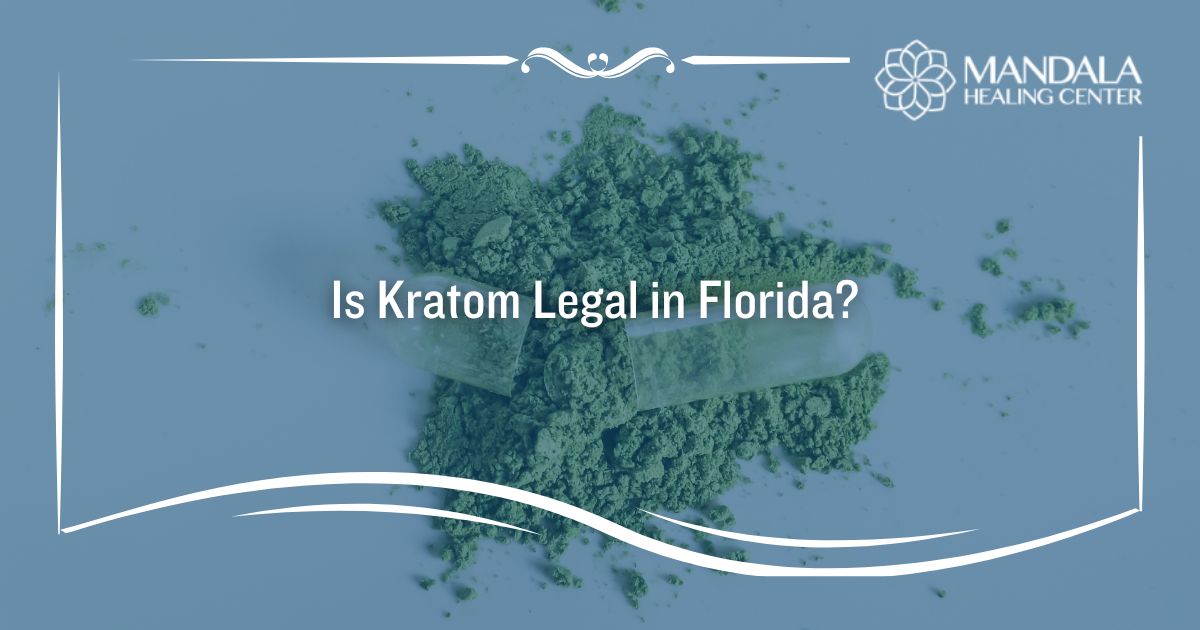Kratom (Mitragyna speciosa) is a tree native to Southeast Asia. People have begun using its leaves to experience mind-altering effects and to cope with opioid withdrawal. Depending on the strain of kratom, you might experience stimulant or depressant effects.[1]
Certain types of kratom can cause depressant effects similar to opioids, so some people consume it when they are experiencing opioid withdrawal symptoms and seeking relief. It is important to note that kratom is not approved to treat any medical condition, including withdrawal. Additionally, there are health risks associated with abusing kratom long-term.
While kratom is not illegal on a federal level, some states have classified it as a controlled substance. For example, it is unlawful to use kratom in Alabama, Arkansas, Indiana, Rhode Island, Tennessee, Vermont, and Wisconsin. That said, it is still legal to sell and consume in Florida.
If you or a loved one regularly uses kratom, you could experience adverse effects like live toxicity and seizures. It is also possible to develop a substance use disorder, making it difficult to stop using kratom without assistance from an addiction treatment program.
In this article, you will learn:
- What is kratom?
- Is kratom legal in Florida?
- What are the risks of abusing kratom?
What is Kratom?
Kratom is marketed as an herbal substance and sold in many stores across America. It contains bioactive compounds that can produce mind-altering effects. The main compounds found in kratom as known as mitragynine and 7-hydroxy mitragynine.
People use kratom by swallowing the plant matter in a capsule, mixing kratom powder into drinks, brewing the leaves into tea, or consuming liquid kratom extract. Depending on what strain they are using, they could experience stimulant or opioid-like effects.
When using kratom, you could experience the following side effects:
- Increased energy and alertness
- Rapid heart rate and chest pain
- Relaxation
- Dizziness and drowsiness
- Confusion
- Pain relief
Some people report that small doses of kratom feel like a stimulant while large doses feel similar to consuming an opioid. Because kratom can cause opioid-like effects, some people use it to treat chronic pain or opioid withdrawal. Unfortunately, abusing kratom can lead to adverse effects, overdose, and long-term addiction.
Is Kratom Legal in the State of Florida?
Kratom is classified as a Schedule I controlled substance in some states. However, it remains legal on a federal level. Because Florida has not created a law to ban kratom, it is still legal to purchase and use.
Additionally, a law has been introduced in the United States called the Kratom Consumer Protection Act, which “prohibits the Food and Drug Administration (FDA) from regulating kratom products in a manner that is more restrictive as compared to regulations for food, dietary supplements, or dietary ingredients.”[2]
Even though kratom regulation is left up to the states, it is not a safe substance to abuse. While you can buy kratom powder, pills, and liquid extract in smoke shops, you should be extremely cautious when it comes to consuming the drug.
What are the Dangers of Using Kratom?
While kratom is legal in Florida, it’s important to know the risks of abusing the drug. The Centers for Disease Control and Prevention (CDC) reports that kratom exposure has led to psychosis, seizures, and even death.[3]
It is also possible to develop an addiction to kratom. The signs of a kratom use disorder include:
- Using more kratom for longer than you intended to
- Wanting to cut back on or quit kratom but being unsuccessful
- Experiencing strong desires or cravings to use kratom
- Failing to maintain responsibilities at work, school, or home due to kratom use
- Experiencing social or interpersonal relationship issues because of kratom
- Continuing to use kratom despite developing physical or mental health problems
- Using kratom in risky situations, such as while driving
- Needing to increase the dose of kratom to experience the desired effect
- Dealing with withdrawal symptoms when you stop using kratom
Kratom can also lead to life-threatening overdose. In one case, a woman’s husband found her unconscious with her lips turning blue. He administered naloxone, thinking she was experiencing an opioid overdose. After the naloxone reversed the overdose and an examination at the hospital took place, it was determined that her overdose was caused by a large amount of kratom.[4]
Find Help for Kratom Abuse and Addiction
If you or a loved one misuses kratom, it’s time to seek professional help. The effects of kratom can be enjoyable for some, however, it is possible to experience adverse effects like psychosis, seizures, and even overdose. Due to this, you should always attend an addiction treatment program when you are dealing with kratom addiction.
At the Mandala Healing Center, we can help you overcome kratom addiction using medical detox, evidence-based therapies, and relapse prevention planning. Our treatment center uses an individualized approach that ensures you get the type of care you need.
Why Choose The Mandala Healing Center? Clients are taken on a journey of healing through complete immersion into evidence-based clinical modalities, multifaceted alternative therapies, and expert medical management, allowing them to fully detox and recover from drug and alcohol addictions. Through a program of care designed to encourage change, a foundation is created that allows clients to find their higher purpose and reclaim their lives.
Contact us today for more information on our kratom rehab program.
References:
- The National Institute on Drug Abuse (NIDA): Kratom
- Congress: H.R.5905 — 118th Congress (2023-2024)
- The Centers for Disease Control and Prevention (CDC): Notes from the Field: Kratom (Mitragyna speciosa) Exposures Reported to Poison Centers — United States, 2010–2015
- Cureus: The Great Imitator: A Case of Accidental Kratom Overdose
















